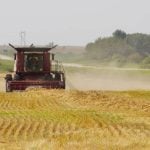I’m sure I’m not the only one feeling a little sick this week watching the deteriorating negotiations between Cargill and the union at its High River plant.
Earlier this week United Food and Commercial Workers (UFCW) Local 401 conducted a vote on Cargill’s latest offer, and workers rejected that offer by a 98 per cent margin, according to the union.
Hopefully, both sides will come to an agreement before Dec. 6, the deadline both sides have set for lockout/strikes.
Read Also

Where to get Canadian Cattlemen during a postal strike
Delivery of our paper editions may be disrupted as of May 23 by the ongoing labour dispute between Canada Post…
Trouble has been brewing at the High River plant since COVID ripped through Cargill’s workforce in the spring of 2020, infecting about half of the 2,000 workers, killing two, and also killing a third person related to a worker. At that time, the union rep I talked to made it clear the COVID outbreak would come up in negotiations once the contract was up at the end of 2020. Lois Harris covered the negotiations for the magazine last December as well, delving into the perspectives of both the union and plant management.
While these enormous plants offer many advantages to the industry, especially when it comes to our export markets, it’s hard to deny the vulnerabilities inherent in the system. Beef producers have known this for a long time. COVID has made that clear, and the current labour strife is driving it home. Meanwhile, beef producers have watched the growing gap between live cattle prices and cutout values with frustration. While we’re expecting producers to regain leverage soon, I’m not sure that will be enough for people.
What to do about it is another question entirely. I am not advocating that beef producers do nothing, but that industry leaders move forward thoughtfully and listen to different, informed viewpoints. The packing industry is highly consolidated for a reason (actually, many reasons). There’s been a call to encourage more, smaller federally inspected plants to open, but there are many roadblocks. Steve Kay outlined the challenges in his column earlier this year. In brief, they are:
- Labour shortages.
- Securing a steady supply of live cattle.
- Marketing – the big plants sell “commodity” beef, but they also have specialty beef brands. It’s tough to compete against them.
- Capital – it takes a tremendous amount of money to build and operate a new plant. New plants need to be able to endure “substantial start-up losses,” as Steve Kay writes.
However, there have been successful smaller federally inspected plants. Harmony Beef, which took over the Rancher’s Beef plant in Balzac a few years back, is a good example. The plant is run by the Vesta family, who know the packing business, and they’ve got a clear marketing strategy. Deb Furber, who has since retired, wrote a great piece on Harmony a few years back. Anyone serious about opening or encouraging smaller federally inspected plants should study the ones that are running to find out how they do it.
There’s been plenty of action south of the border, with the American industry looking at establishing contract libraries and considering mandating negotiated cash minimums, to boost price transparency. Steve Dittmer has been updating us regularly in his column and often cautions against any action that will create more costs, as they’re likely to be passed down to beef producers.
Perhaps the leverage packers often have can be mitigated somewhat in extreme situations, like what we’ve seen with COVID. Charlie Gracey, writing for the magazine about the sudden drop in cattle marketed and cattle prices last year, wrote the following, and I think his ideas deserve discussion:
Is it not possible to set a “fair trading price” channel to contain these extremes when the extremes are caused by external and abnormal circumstances? Would that not improve the discovery of a fair price to the benefit of those who have no option but to sell? Is it too intrusive to require that intermediates not exploit an unnatural circumstance? Would anyone consider this intervention unjustified after witnessing what has already happened?
One thing that might help ease domestic supply crunches is allowing interprovincial trade on provincially inspected meat from provincially inspected plants (provided we can all agree on criteria). Interprovincial trade is on the federal ag agenda, according to the Guelph Statement. It won’t solve this entire problem but encouraging more processors to expand or start up by offering them a wider market would give beef producers another marketing option.
The Alberta Beef Producers are studying supply chain issues, looking at the barriers faced by small processors as well as the big dogs. I think that’s a good start, and it will be interesting to see what they come up with.
There will not be a single silver bullet, as the issue is so complex. Better minds than mine are already working on this. But, for a start, I think any solutions need to keep the following in mind:
- The cattle cycle, and where we’re at in that cyle. With numbers down in North America, any new plants will have to compete with established plants for fewer cattle.
- Cost. Anything that adds cost, intentionally or not, risks passing that cost through the supply chain, ultimately landing at the ranch gate.
- Challenges processors face, including securing labour, capital, marketing and even gaining regulatory approval at every level of government.
- The importance of maintaining our export capacity.
As one producer tweeted earlier this week, Cargill’s labour issue isn’t a black swan event. It’s more like a slow-moving train on fire. In the short term, let’s hope they can extinguish the fire and get things back on track.
















